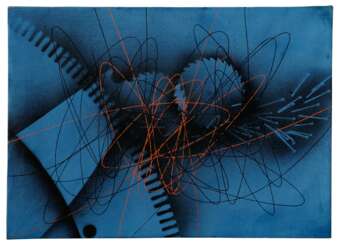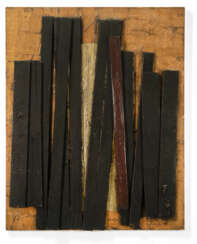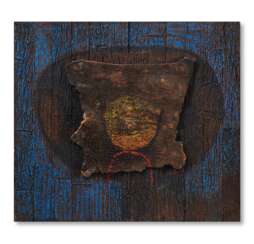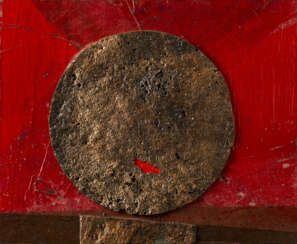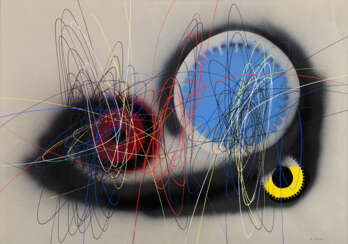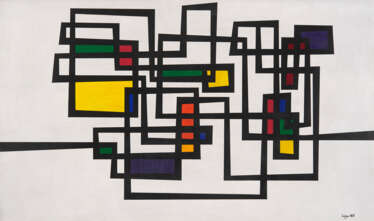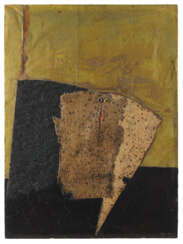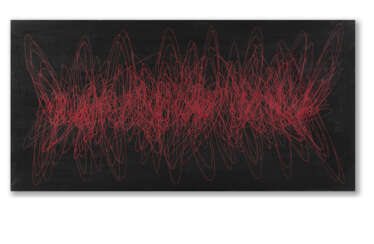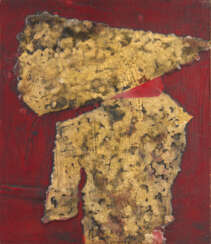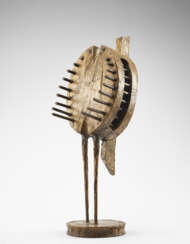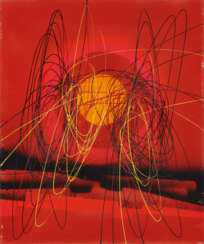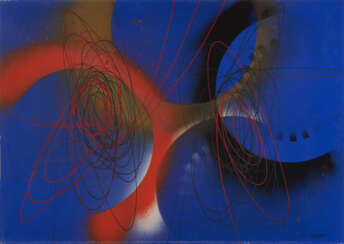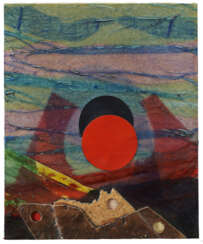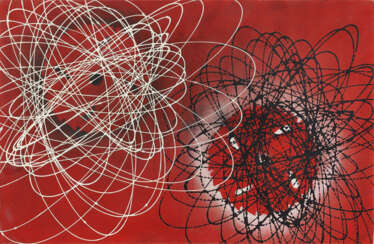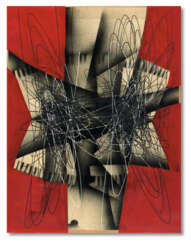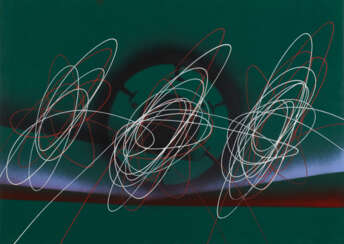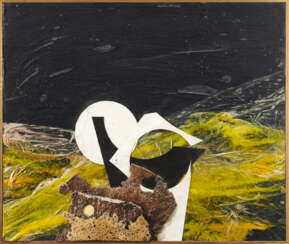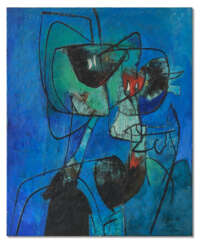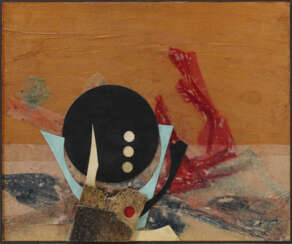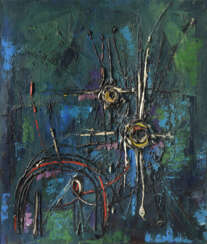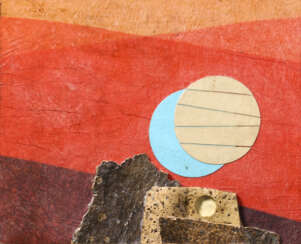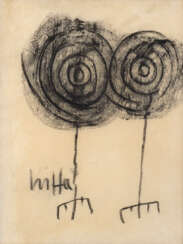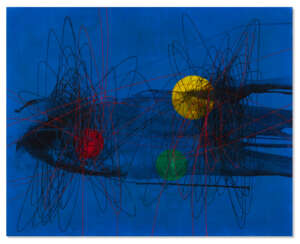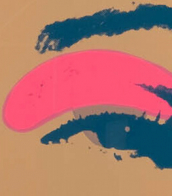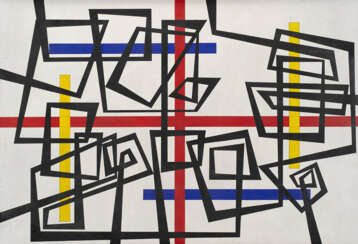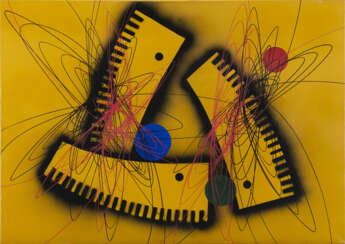roberto crippa (1921 - 1972)
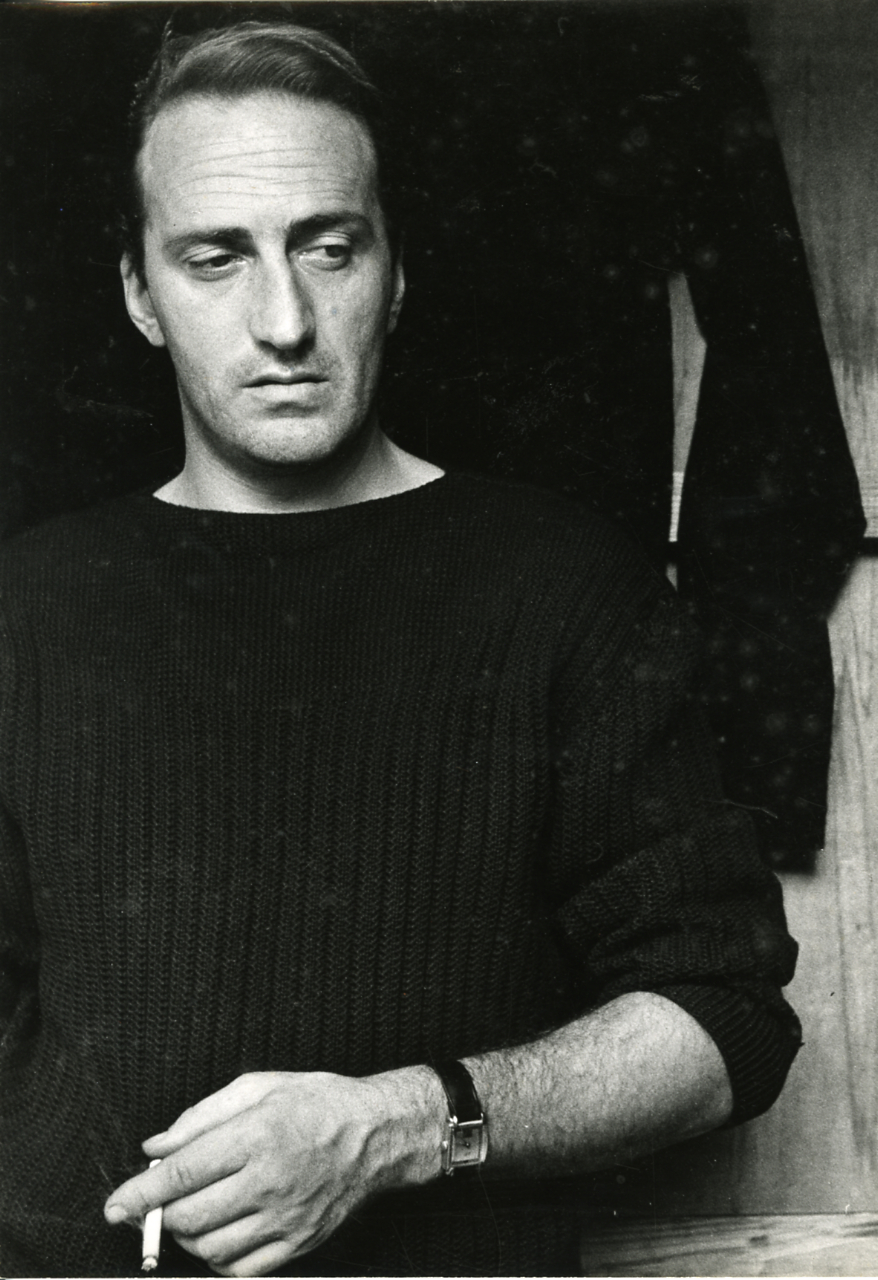
Roberto Crippa was an Italian painter and sculptor. He studied at the Brera Academy of Fine Arts in Milan, where he developed his artistic skills by exploring different styles and techniques.
Crippa's early work was influenced by Surrealism, with its dreamy and symbolic images. However, he soon moved away from figurative representation and began to use abstraction. His artistic style evolved into a unique combination of abstraction and geometric forms.
One of Crippa's notable contributions to art was his involvement in the Movimento Arte Concreta (Concrete Art) movement in Italy. This movement advocated non-representational art, emphasizing geometric forms, mathematical precision and a focus on the formal aspects of art. Krippa's work from this period demonstrates a fascination with grids, lines and geometric patterns.
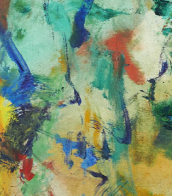

Roberto Crippa was an Italian painter and sculptor. He studied at the Brera Academy of Fine Arts in Milan, where he developed his artistic skills by exploring different styles and techniques.
Crippa's early work was influenced by Surrealism, with its dreamy and symbolic images. However, he soon moved away from figurative representation and began to use abstraction. His artistic style evolved into a unique combination of abstraction and geometric forms.
One of Crippa's notable contributions to art was his involvement in the Movimento Arte Concreta (Concrete Art) movement in Italy. This movement advocated non-representational art, emphasizing geometric forms, mathematical precision and a focus on the formal aspects of art. Krippa's work from this period demonstrates a fascination with grids, lines and geometric patterns.
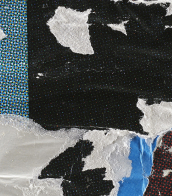

Roberto Crippa was an Italian painter and sculptor. He studied at the Brera Academy of Fine Arts in Milan, where he developed his artistic skills by exploring different styles and techniques.
Crippa's early work was influenced by Surrealism, with its dreamy and symbolic images. However, he soon moved away from figurative representation and began to use abstraction. His artistic style evolved into a unique combination of abstraction and geometric forms.
One of Crippa's notable contributions to art was his involvement in the Movimento Arte Concreta (Concrete Art) movement in Italy. This movement advocated non-representational art, emphasizing geometric forms, mathematical precision and a focus on the formal aspects of art. Krippa's work from this period demonstrates a fascination with grids, lines and geometric patterns.
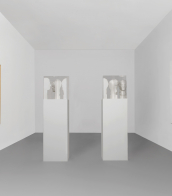

Roberto Crippa was an Italian painter and sculptor. He studied at the Brera Academy of Fine Arts in Milan, where he developed his artistic skills by exploring different styles and techniques.
Crippa's early work was influenced by Surrealism, with its dreamy and symbolic images. However, he soon moved away from figurative representation and began to use abstraction. His artistic style evolved into a unique combination of abstraction and geometric forms.
One of Crippa's notable contributions to art was his involvement in the Movimento Arte Concreta (Concrete Art) movement in Italy. This movement advocated non-representational art, emphasizing geometric forms, mathematical precision and a focus on the formal aspects of art. Krippa's work from this period demonstrates a fascination with grids, lines and geometric patterns.
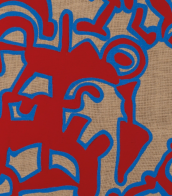

Roberto Crippa was an Italian painter and sculptor. He studied at the Brera Academy of Fine Arts in Milan, where he developed his artistic skills by exploring different styles and techniques.
Crippa's early work was influenced by Surrealism, with its dreamy and symbolic images. However, he soon moved away from figurative representation and began to use abstraction. His artistic style evolved into a unique combination of abstraction and geometric forms.
One of Crippa's notable contributions to art was his involvement in the Movimento Arte Concreta (Concrete Art) movement in Italy. This movement advocated non-representational art, emphasizing geometric forms, mathematical precision and a focus on the formal aspects of art. Krippa's work from this period demonstrates a fascination with grids, lines and geometric patterns.
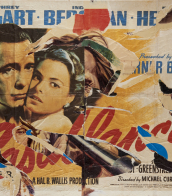

Roberto Crippa was an Italian painter and sculptor. He studied at the Brera Academy of Fine Arts in Milan, where he developed his artistic skills by exploring different styles and techniques.
Crippa's early work was influenced by Surrealism, with its dreamy and symbolic images. However, he soon moved away from figurative representation and began to use abstraction. His artistic style evolved into a unique combination of abstraction and geometric forms.
One of Crippa's notable contributions to art was his involvement in the Movimento Arte Concreta (Concrete Art) movement in Italy. This movement advocated non-representational art, emphasizing geometric forms, mathematical precision and a focus on the formal aspects of art. Krippa's work from this period demonstrates a fascination with grids, lines and geometric patterns.


Roberto Crippa was an Italian painter and sculptor. He studied at the Brera Academy of Fine Arts in Milan, where he developed his artistic skills by exploring different styles and techniques.
Crippa's early work was influenced by Surrealism, with its dreamy and symbolic images. However, he soon moved away from figurative representation and began to use abstraction. His artistic style evolved into a unique combination of abstraction and geometric forms.
One of Crippa's notable contributions to art was his involvement in the Movimento Arte Concreta (Concrete Art) movement in Italy. This movement advocated non-representational art, emphasizing geometric forms, mathematical precision and a focus on the formal aspects of art. Krippa's work from this period demonstrates a fascination with grids, lines and geometric patterns.
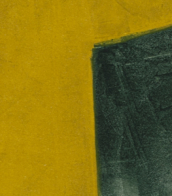

Roberto Crippa was an Italian painter and sculptor. He studied at the Brera Academy of Fine Arts in Milan, where he developed his artistic skills by exploring different styles and techniques.
Crippa's early work was influenced by Surrealism, with its dreamy and symbolic images. However, he soon moved away from figurative representation and began to use abstraction. His artistic style evolved into a unique combination of abstraction and geometric forms.
One of Crippa's notable contributions to art was his involvement in the Movimento Arte Concreta (Concrete Art) movement in Italy. This movement advocated non-representational art, emphasizing geometric forms, mathematical precision and a focus on the formal aspects of art. Krippa's work from this period demonstrates a fascination with grids, lines and geometric patterns.


Roberto Crippa was an Italian painter and sculptor. He studied at the Brera Academy of Fine Arts in Milan, where he developed his artistic skills by exploring different styles and techniques.
Crippa's early work was influenced by Surrealism, with its dreamy and symbolic images. However, he soon moved away from figurative representation and began to use abstraction. His artistic style evolved into a unique combination of abstraction and geometric forms.
One of Crippa's notable contributions to art was his involvement in the Movimento Arte Concreta (Concrete Art) movement in Italy. This movement advocated non-representational art, emphasizing geometric forms, mathematical precision and a focus on the formal aspects of art. Krippa's work from this period demonstrates a fascination with grids, lines and geometric patterns.
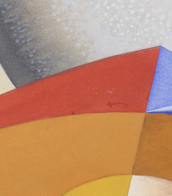

Roberto Crippa was an Italian painter and sculptor. He studied at the Brera Academy of Fine Arts in Milan, where he developed his artistic skills by exploring different styles and techniques.
Crippa's early work was influenced by Surrealism, with its dreamy and symbolic images. However, he soon moved away from figurative representation and began to use abstraction. His artistic style evolved into a unique combination of abstraction and geometric forms.
One of Crippa's notable contributions to art was his involvement in the Movimento Arte Concreta (Concrete Art) movement in Italy. This movement advocated non-representational art, emphasizing geometric forms, mathematical precision and a focus on the formal aspects of art. Krippa's work from this period demonstrates a fascination with grids, lines and geometric patterns.
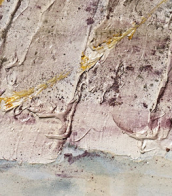

Roberto Crippa was an Italian painter and sculptor. He studied at the Brera Academy of Fine Arts in Milan, where he developed his artistic skills by exploring different styles and techniques.
Crippa's early work was influenced by Surrealism, with its dreamy and symbolic images. However, he soon moved away from figurative representation and began to use abstraction. His artistic style evolved into a unique combination of abstraction and geometric forms.
One of Crippa's notable contributions to art was his involvement in the Movimento Arte Concreta (Concrete Art) movement in Italy. This movement advocated non-representational art, emphasizing geometric forms, mathematical precision and a focus on the formal aspects of art. Krippa's work from this period demonstrates a fascination with grids, lines and geometric patterns.


Roberto Crippa was an Italian painter and sculptor. He studied at the Brera Academy of Fine Arts in Milan, where he developed his artistic skills by exploring different styles and techniques.
Crippa's early work was influenced by Surrealism, with its dreamy and symbolic images. However, he soon moved away from figurative representation and began to use abstraction. His artistic style evolved into a unique combination of abstraction and geometric forms.
One of Crippa's notable contributions to art was his involvement in the Movimento Arte Concreta (Concrete Art) movement in Italy. This movement advocated non-representational art, emphasizing geometric forms, mathematical precision and a focus on the formal aspects of art. Krippa's work from this period demonstrates a fascination with grids, lines and geometric patterns.


Roberto Crippa was an Italian painter and sculptor. He studied at the Brera Academy of Fine Arts in Milan, where he developed his artistic skills by exploring different styles and techniques.
Crippa's early work was influenced by Surrealism, with its dreamy and symbolic images. However, he soon moved away from figurative representation and began to use abstraction. His artistic style evolved into a unique combination of abstraction and geometric forms.
One of Crippa's notable contributions to art was his involvement in the Movimento Arte Concreta (Concrete Art) movement in Italy. This movement advocated non-representational art, emphasizing geometric forms, mathematical precision and a focus on the formal aspects of art. Krippa's work from this period demonstrates a fascination with grids, lines and geometric patterns.
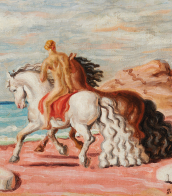

Roberto Crippa was an Italian painter and sculptor. He studied at the Brera Academy of Fine Arts in Milan, where he developed his artistic skills by exploring different styles and techniques.
Crippa's early work was influenced by Surrealism, with its dreamy and symbolic images. However, he soon moved away from figurative representation and began to use abstraction. His artistic style evolved into a unique combination of abstraction and geometric forms.
One of Crippa's notable contributions to art was his involvement in the Movimento Arte Concreta (Concrete Art) movement in Italy. This movement advocated non-representational art, emphasizing geometric forms, mathematical precision and a focus on the formal aspects of art. Krippa's work from this period demonstrates a fascination with grids, lines and geometric patterns.
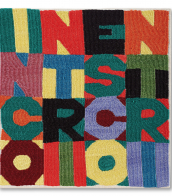

Roberto Crippa was an Italian painter and sculptor. He studied at the Brera Academy of Fine Arts in Milan, where he developed his artistic skills by exploring different styles and techniques.
Crippa's early work was influenced by Surrealism, with its dreamy and symbolic images. However, he soon moved away from figurative representation and began to use abstraction. His artistic style evolved into a unique combination of abstraction and geometric forms.
One of Crippa's notable contributions to art was his involvement in the Movimento Arte Concreta (Concrete Art) movement in Italy. This movement advocated non-representational art, emphasizing geometric forms, mathematical precision and a focus on the formal aspects of art. Krippa's work from this period demonstrates a fascination with grids, lines and geometric patterns.


Roberto Crippa was an Italian painter and sculptor. He studied at the Brera Academy of Fine Arts in Milan, where he developed his artistic skills by exploring different styles and techniques.
Crippa's early work was influenced by Surrealism, with its dreamy and symbolic images. However, he soon moved away from figurative representation and began to use abstraction. His artistic style evolved into a unique combination of abstraction and geometric forms.
One of Crippa's notable contributions to art was his involvement in the Movimento Arte Concreta (Concrete Art) movement in Italy. This movement advocated non-representational art, emphasizing geometric forms, mathematical precision and a focus on the formal aspects of art. Krippa's work from this period demonstrates a fascination with grids, lines and geometric patterns.


Roberto Crippa was an Italian painter and sculptor. He studied at the Brera Academy of Fine Arts in Milan, where he developed his artistic skills by exploring different styles and techniques.
Crippa's early work was influenced by Surrealism, with its dreamy and symbolic images. However, he soon moved away from figurative representation and began to use abstraction. His artistic style evolved into a unique combination of abstraction and geometric forms.
One of Crippa's notable contributions to art was his involvement in the Movimento Arte Concreta (Concrete Art) movement in Italy. This movement advocated non-representational art, emphasizing geometric forms, mathematical precision and a focus on the formal aspects of art. Krippa's work from this period demonstrates a fascination with grids, lines and geometric patterns.


Roberto Crippa was an Italian painter and sculptor. He studied at the Brera Academy of Fine Arts in Milan, where he developed his artistic skills by exploring different styles and techniques.
Crippa's early work was influenced by Surrealism, with its dreamy and symbolic images. However, he soon moved away from figurative representation and began to use abstraction. His artistic style evolved into a unique combination of abstraction and geometric forms.
One of Crippa's notable contributions to art was his involvement in the Movimento Arte Concreta (Concrete Art) movement in Italy. This movement advocated non-representational art, emphasizing geometric forms, mathematical precision and a focus on the formal aspects of art. Krippa's work from this period demonstrates a fascination with grids, lines and geometric patterns.
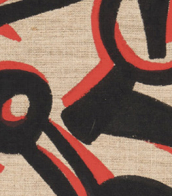

Roberto Crippa was an Italian painter and sculptor. He studied at the Brera Academy of Fine Arts in Milan, where he developed his artistic skills by exploring different styles and techniques.
Crippa's early work was influenced by Surrealism, with its dreamy and symbolic images. However, he soon moved away from figurative representation and began to use abstraction. His artistic style evolved into a unique combination of abstraction and geometric forms.
One of Crippa's notable contributions to art was his involvement in the Movimento Arte Concreta (Concrete Art) movement in Italy. This movement advocated non-representational art, emphasizing geometric forms, mathematical precision and a focus on the formal aspects of art. Krippa's work from this period demonstrates a fascination with grids, lines and geometric patterns.
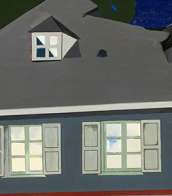

Roberto Crippa was an Italian painter and sculptor. He studied at the Brera Academy of Fine Arts in Milan, where he developed his artistic skills by exploring different styles and techniques.
Crippa's early work was influenced by Surrealism, with its dreamy and symbolic images. However, he soon moved away from figurative representation and began to use abstraction. His artistic style evolved into a unique combination of abstraction and geometric forms.
One of Crippa's notable contributions to art was his involvement in the Movimento Arte Concreta (Concrete Art) movement in Italy. This movement advocated non-representational art, emphasizing geometric forms, mathematical precision and a focus on the formal aspects of art. Krippa's work from this period demonstrates a fascination with grids, lines and geometric patterns.


Roberto Crippa was an Italian painter and sculptor. He studied at the Brera Academy of Fine Arts in Milan, where he developed his artistic skills by exploring different styles and techniques.
Crippa's early work was influenced by Surrealism, with its dreamy and symbolic images. However, he soon moved away from figurative representation and began to use abstraction. His artistic style evolved into a unique combination of abstraction and geometric forms.
One of Crippa's notable contributions to art was his involvement in the Movimento Arte Concreta (Concrete Art) movement in Italy. This movement advocated non-representational art, emphasizing geometric forms, mathematical precision and a focus on the formal aspects of art. Krippa's work from this period demonstrates a fascination with grids, lines and geometric patterns.


Roberto Crippa was an Italian painter and sculptor. He studied at the Brera Academy of Fine Arts in Milan, where he developed his artistic skills by exploring different styles and techniques.
Crippa's early work was influenced by Surrealism, with its dreamy and symbolic images. However, he soon moved away from figurative representation and began to use abstraction. His artistic style evolved into a unique combination of abstraction and geometric forms.
One of Crippa's notable contributions to art was his involvement in the Movimento Arte Concreta (Concrete Art) movement in Italy. This movement advocated non-representational art, emphasizing geometric forms, mathematical precision and a focus on the formal aspects of art. Krippa's work from this period demonstrates a fascination with grids, lines and geometric patterns.


Roberto Crippa was an Italian painter and sculptor. He studied at the Brera Academy of Fine Arts in Milan, where he developed his artistic skills by exploring different styles and techniques.
Crippa's early work was influenced by Surrealism, with its dreamy and symbolic images. However, he soon moved away from figurative representation and began to use abstraction. His artistic style evolved into a unique combination of abstraction and geometric forms.
One of Crippa's notable contributions to art was his involvement in the Movimento Arte Concreta (Concrete Art) movement in Italy. This movement advocated non-representational art, emphasizing geometric forms, mathematical precision and a focus on the formal aspects of art. Krippa's work from this period demonstrates a fascination with grids, lines and geometric patterns.


Roberto Crippa was an Italian painter and sculptor. He studied at the Brera Academy of Fine Arts in Milan, where he developed his artistic skills by exploring different styles and techniques.
Crippa's early work was influenced by Surrealism, with its dreamy and symbolic images. However, he soon moved away from figurative representation and began to use abstraction. His artistic style evolved into a unique combination of abstraction and geometric forms.
One of Crippa's notable contributions to art was his involvement in the Movimento Arte Concreta (Concrete Art) movement in Italy. This movement advocated non-representational art, emphasizing geometric forms, mathematical precision and a focus on the formal aspects of art. Krippa's work from this period demonstrates a fascination with grids, lines and geometric patterns.


Roberto Crippa was an Italian painter and sculptor. He studied at the Brera Academy of Fine Arts in Milan, where he developed his artistic skills by exploring different styles and techniques.
Crippa's early work was influenced by Surrealism, with its dreamy and symbolic images. However, he soon moved away from figurative representation and began to use abstraction. His artistic style evolved into a unique combination of abstraction and geometric forms.
One of Crippa's notable contributions to art was his involvement in the Movimento Arte Concreta (Concrete Art) movement in Italy. This movement advocated non-representational art, emphasizing geometric forms, mathematical precision and a focus on the formal aspects of art. Krippa's work from this period demonstrates a fascination with grids, lines and geometric patterns.


Roberto Crippa was an Italian painter and sculptor. He studied at the Brera Academy of Fine Arts in Milan, where he developed his artistic skills by exploring different styles and techniques.
Crippa's early work was influenced by Surrealism, with its dreamy and symbolic images. However, he soon moved away from figurative representation and began to use abstraction. His artistic style evolved into a unique combination of abstraction and geometric forms.
One of Crippa's notable contributions to art was his involvement in the Movimento Arte Concreta (Concrete Art) movement in Italy. This movement advocated non-representational art, emphasizing geometric forms, mathematical precision and a focus on the formal aspects of art. Krippa's work from this period demonstrates a fascination with grids, lines and geometric patterns.


Roberto Crippa was an Italian painter and sculptor. He studied at the Brera Academy of Fine Arts in Milan, where he developed his artistic skills by exploring different styles and techniques.
Crippa's early work was influenced by Surrealism, with its dreamy and symbolic images. However, he soon moved away from figurative representation and began to use abstraction. His artistic style evolved into a unique combination of abstraction and geometric forms.
One of Crippa's notable contributions to art was his involvement in the Movimento Arte Concreta (Concrete Art) movement in Italy. This movement advocated non-representational art, emphasizing geometric forms, mathematical precision and a focus on the formal aspects of art. Krippa's work from this period demonstrates a fascination with grids, lines and geometric patterns.


Roberto Crippa was an Italian painter and sculptor. He studied at the Brera Academy of Fine Arts in Milan, where he developed his artistic skills by exploring different styles and techniques.
Crippa's early work was influenced by Surrealism, with its dreamy and symbolic images. However, he soon moved away from figurative representation and began to use abstraction. His artistic style evolved into a unique combination of abstraction and geometric forms.
One of Crippa's notable contributions to art was his involvement in the Movimento Arte Concreta (Concrete Art) movement in Italy. This movement advocated non-representational art, emphasizing geometric forms, mathematical precision and a focus on the formal aspects of art. Krippa's work from this period demonstrates a fascination with grids, lines and geometric patterns.
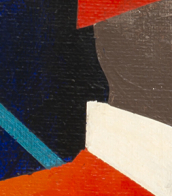

Roberto Crippa was an Italian painter and sculptor. He studied at the Brera Academy of Fine Arts in Milan, where he developed his artistic skills by exploring different styles and techniques.
Crippa's early work was influenced by Surrealism, with its dreamy and symbolic images. However, he soon moved away from figurative representation and began to use abstraction. His artistic style evolved into a unique combination of abstraction and geometric forms.
One of Crippa's notable contributions to art was his involvement in the Movimento Arte Concreta (Concrete Art) movement in Italy. This movement advocated non-representational art, emphasizing geometric forms, mathematical precision and a focus on the formal aspects of art. Krippa's work from this period demonstrates a fascination with grids, lines and geometric patterns.

